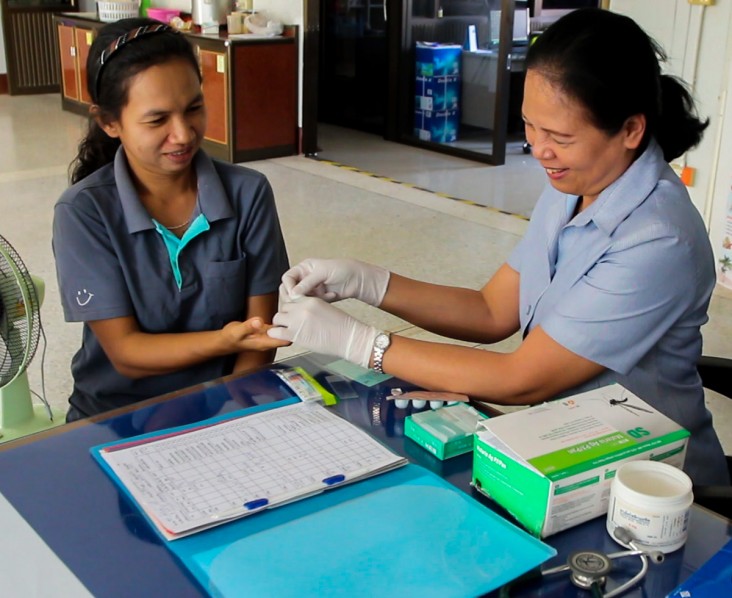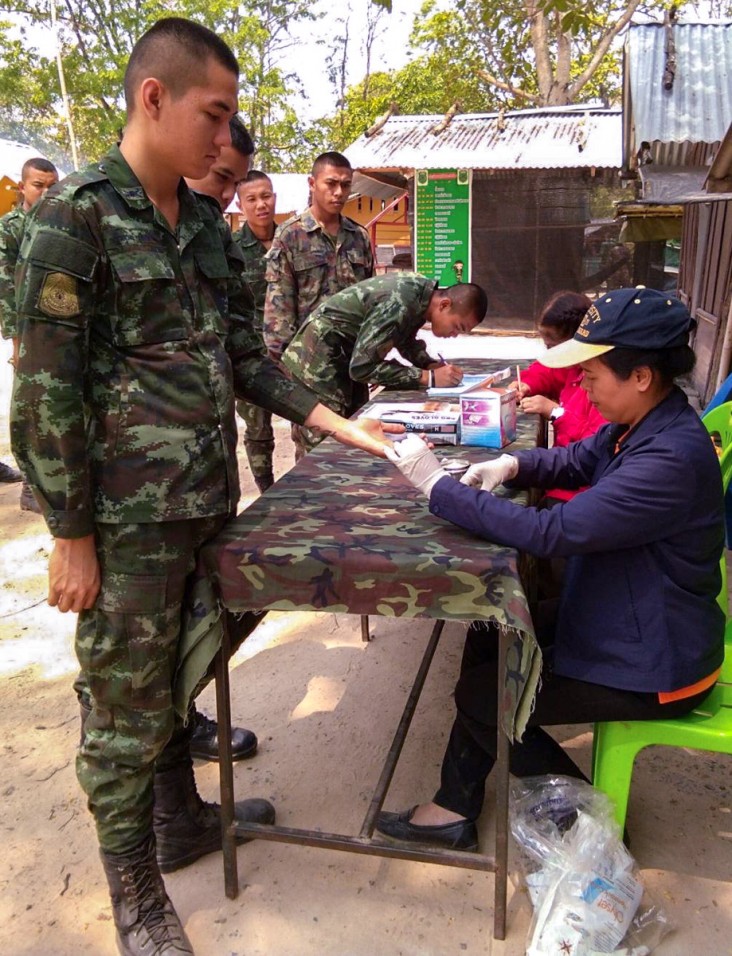
Kanyarat Lausatianragit collects blood for malaria testing. Photo Credit: Sisaket Provincial Public Health Department
As the eldest of four children, Kanyarat always thought she would study forestry and spend the rest of her days planting, pruning and harvesting pomelo, mango, sugar cane, bananas, limes and rice on the family farm an hour’s drive west of Bangkok.
In the end, she decided to take a different path. With good job prospects awaiting just after graduation, she earned a degree in medical laboratory science at Mahidol University. She first worked at Siriraj hospital as a research assistant before completing another bachelor’s degree in biology at Ramkumhaeng University. Over time, she proved herself and became responsible for overseeing the Sisaket provincial vector borne diseases program, including the malaria control program. Today, as a public health technical officer, she is one of the many women leaders who are vital to the success of Thailand’s national malaria program.
“At first, I only had basic knowledge of malaria—not enough to lead the process to control the disease. I followed the work plan and learned to analyze the data,” she said. “I read to improve my knowledge and participated in training activities. I also learned how to use the National Malaria Information System to help me plan my work.”
With funding from the U.S. President’s Malaria Initiative, The U.S. Agency for International Development (USAID) and its partners provide training on how to use Thailand’s malaria surveillance system to test, diagnose and follow-up on cases to ensure complete treatment and to monitor coverage of bednets for malaria prevention. Recently, the World Health Organization, another USAID partner, reported drug resistance to DHA-PIP (the current drug regimen for malaria treatment) in Sisaket. The control and elimination of drug resistance in Sisaket is critical for the regional and the world, and Kanyarat is a key collaborator with the U.S. Government in this effort.
As a lab technician and now a leader in public health, Kanyarat works on the frontlines. Much of her work is in the field, especially along the Thailand and Cambodia border. From her base in Sisaket’s Mueng District, she leads teams of approximately 10 people, traveling long distances by car and boat to reach communities in need and to provide services at mobile clinics. The people she helps, who live up to a 12 hours’ drive from Bangkok, are rubber plantations workers, soldiers at the army camps, and village farmers, woodcutters and others. This area features large rubber plantations, and migrant workers crossing over the border and back are exposed to tropical rainforests as well as malaria. Patrolling border police are at greatest risk of infection.
Kanyarat networks and mobilizes local agencies, provincial and district government departments and, importantly, community leaders. She works side-by-side with her staff and health facilities to promote testing, access to bednets, treatment and follow-up of all malaria cases in health facilities, and supports the distribution of insecticide-treated nets and hammocks.
She pioneered the use of a mobile messaging platform, the Sisaket Malaria LINE group, which allows her team to report to the national Malaria Information System in real time. It works like this: A message sent to the LINE group will enter the system within 24 hours and prompt the rapid response team to take action for disease control and treatment within seven days. Trained health volunteers at a village malaria post, medical center health staff, or a hospital doctor can provide testing and treatment within one day if the case is found to be positive. This tool has transformed malaria control in Sisaket and has greatly enhanced communications and coordination among all stakeholders for malaria elimination.
Even though Kanyarat is a champion in the fight to end malaria, she has found that some people still hold traditional attitudes and stereotypes about what kind of work women should do, such as work at home or in the confines of an office environment. However, she has never been one to be constrained by what others think. In her view, everyone, regardless of their gender, is equal in their ability to work on malaria control.
“Women and men don’t differ in terms of malaria work,” she said. “We all have to work in a structured way, following scientific principles…The most important thing is we should be flexible, understand the context of the field and collaborate.”
Because of Kanyarat’s leadership, Sisaket Province is on its way to malaria elimination. Now 56, married with three adult children, she continues to rally public health allies such as local authorities, nongovernmental organizations, businesses and the military because she believes that with knowledge and skills, people will be empowered to take care of themselves, their families and their communities. As a public health champion, Kanyarat is doing just that—improving the health and quality of life in Sisaket Province. Her goal? See malaria eliminated from the province in 10 years, before she retires. Her contribution is greatly valued by those around her.
“I respect Kanyarat for her skillful coordination between the Ministry of Public Health and a range of local agencies who must collaborate to control malaria outbreaks,”said Dr. Prayuth Sudathip of the Bureau of Vector Borne Diseases. “She is a good role model for women, especially the next generation of female public health practitioners.”
Thailand has achieved significant progress in reducing the incidence of malaria, with most malaria transmission foci concentrated along border provinces. Aligned with the Malaria Elimination in the Greater Mekong Subregion 2015–2030* plan, Thailand has laid out a vision to achieve malaria-free status by 2024. Starting in 2015, Inform Asia: USAID’s Health Research Program, funded by the U.S. President’s Malaria Initiative, began working with Thailand’s Bureau of Vector Borne Disease, a unit within the Ministry of Public Health, to strengthen the country’s national Malaria Information System and the capacity of its staff to use data for decision making.
The Bureau of Vector Borne Diseases (BVBD) within Thailand’s Ministry of Public Health leads the National Malaria Elimination Program.
To assist this effort, USAID supports Inform Asia: USAID’s Health Research Program to work with the BVBD. Implemented by RTI International, Inform Asia Associate Award 2 began in September 2015 and will end in September 2020; it is part of the U.S. President’s Malaria Initiative.
* World Health Organization, November 2016. Eliminating Malaria in the Greater Mekong Subregion: United to End a Deadly Disease
This story originally appeared on the USAID’s Asia Regional Mission’s page.

